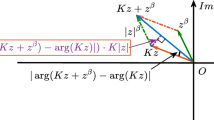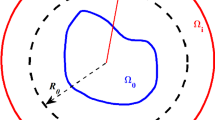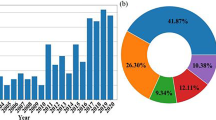Abstract
This paper develops and analyzes a general iterative framework for solving parameter-dependent and random convection–diffusion problems. It is inspired by the multi-modes method and the ensemble method and extends those methods into a more general and unified framework. The main idea of the framework is to reformulate the underlying problem into another problem with parameter-independent convection and diffusion coefficients and a parameter-dependent (and solution-dependent) right-hand side, a fixed-point iteration is then employed to compute the solution of the reformulated problem. The main benefit of the proposed approach is that an efficient direct solver and a block Krylov subspace iterative solver can be used at each iteration, allowing to reuse the LU matrix factorization or to do an efficient matrix-matrix multiplication for all parameters, which in turn results in significant computation saving. Convergence and rates of convergence are established for the iterative method both at the variational continuous level and at the finite element discrete level under some structure conditions. Several strategies for establishing reformulations of parameter-dependent and random diffusion and convection–diffusion problems are proposed and their computational complexity is analyzed. Several 1-D and 2-D numerical experiments are also provided to demonstrate the efficiency of the proposed iterative method and to validate the theoretical convergence results.












Similar content being viewed by others
Data Availability
The datasets generated during and/or analyzed during the current study are available from the corresponding author on reasonable request.
References
Rheinboldt, W.C.: Numerical Analysis of Parametrized Nonlinear Equations. Wiley, New York (1986)
Hesthaven, J.S., Rozza, G., Stamm, B.: Certified Reduced Basis Methods for Parametrized Partial Differential Equations. Springer, New York (2015)
Quarteroni, A., Manzoni, A., Negri, F.: Reduced Basis Methods for Partial Differential Equations: An Introduction. Springer, New York (2015)
Antoulas, A.C., Beattie, C.A., Güğercin, S.: Interpolatory Methods for Model Reduction. SIAM, Philadelphia (2020)
Brunton, S.L., Kutz, J.N.: Data-Driven Science and Engineering: Machine Learning, Dynamical Systems, and Control. Cambridge University Press, London (2019)
Jiang, N., Layton, W.: An algorithm for fast calculation of flow ensembles. Int. J. Uncertain. Quant. 4, 273–301 (2014)
Gunzburger, M., Jiang, N., Wang, Z.: An efficient algorithm for simulating ensembles of parameterized flow problems. IMA J. Numer. Anal. 39, 1180–1205 (2019)
Gunzburger, M., Jiang, N., Schneier, M.: An ensemble-proper orthogonal decomposition method for the nonstationary Navier–Stokes equations. SIAM J. Numer. Anal. 55, 286–304 (2017)
Gunzburger, M., Jiang, N., Wang, Z.: A second-order time-stepping scheme for simulating ensembles of parameterized flow problems. Comput. Methods Appl. Math. 19, 681–701 (2017)
Luo, Y., Wang, Z.: An ensemble algorithm for numerical solutions to deterministic and random parabolic PDEs. SIAM J. Numer. Anal. 56(2), 859–876 (2018)
Luo, Y., Wang, Z.: A multilevel Monte Carlo ensemble scheme for solving random parabolic PDEs. SIAM J. Sci. Comput. 41, A622–A642 (2019)
Feng, X., Lin, J., Lorton, C.: A multi-modes Monte Carlo finite element method for elliptic partial differential equations with random coefficients. Int. J. Uncertain. Quant. 6(5), 429–443 (2016)
Feng, X., Lin, J., Lorton, C.: An efficient numerical method for acoustic wave scattering in random media. SIAM/ASA J. Uncertain. Quant. 3, 790–822 (2015)
Feng, X., Lin, J., Lorton, C.: An efficient Monte Carlo interior penalty discontinuous Galerkin method for the time-harmonic Maxwell’s Equations with random coefficients. J. Sci. Comput. 80, 1498–1528 (2019)
Silvester, D., Elman, H., Ramage, A.: Incompressible Flow and Iterative Solver Software (IFISS), version 3.5 (2016)
Brenner, S.C., Scott, L.R.: The Mathematical Theory of Finite Element Methods, Third edition. Texts in Applied Mathematics, vol. 15. Springer, New York (2008)
Baker, A.H., Dennis, J.M., Jessup, E.R.: On improving linear solver performance: a block variant of GMRES. SIAM J. Sci. Comput. 27, 1608–1626 (2006)
Duff, I.S., Erisman, A.M., Reid, J.K.: Direct Methods for Sparse Matrices. Oxford University Press, London (2017)
Ju, L., Leng, W., Wang, Z., Yuan, S.: Numerical investigation of ensemble methods with block iterative solvers for evolution problems. Discrete Contin. Dyn. Syst. Ser. B. 25(12), 4905–4923 (2020)
George, A.: Nested dissection of a regular finite element mesh. SIAM J. Numer. Anal. 10(2), 345–363 (1973)
Davis, T.A.: Direct Methods for Sparse Linear Systems. SIAM, Philadelphia (2006)
Du, Q., Faber, V., Gunzburger, M.: Centroidal Voronoi tessellations: applications and algorithms. SIAM Rev. 41(4), 637–676 (1999)
Funding
Funding for each author has been given earlier.
Author information
Authors and Affiliations
Corresponding author
Ethics declarations
Conflict of interest
No conflict of interest is involved with this research, both data and code are available from the corresponding author on reasonable request.
Additional information
Publisher's Note
Springer Nature remains neutral with regard to jurisdictional claims in published maps and institutional affiliations.
Xiaobing Feng and Liet Vo: The work of these authors was partially supported by the NSF Grants DMS-1620168 and DMS-2012414. Yan Luo: The work of this author was supported by the Young Scientists Fund of the National Natural Science Foundation of China grant 11901078 and by the Fundamental Research Funds for the Central Universities Grant ZGX2020J021. Zhu Wang: The work of this author was partially supported by the NSF Grant DMS-1913073.
Rights and permissions
About this article
Cite this article
Feng, X., Luo, Y., Vo, L. et al. An Efficient Iterative Method for Solving Parameter-Dependent and Random Convection–Diffusion Problems. J Sci Comput 90, 72 (2022). https://doi.org/10.1007/s10915-021-01737-z
Received:
Revised:
Accepted:
Published:
DOI: https://doi.org/10.1007/s10915-021-01737-z
Keywords
- Parameter-dependent and random convection–diffusion problems
- Multi-modes method
- Ensemble method
- Finite element
- Iterative algorithm
- Computational complexity




